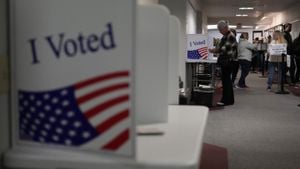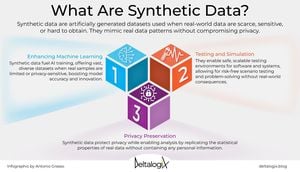Artificial intelligence (AI) is becoming increasingly influential across various sectors, with education being one of them. Like many institutions, Sacramento State University has taken significant steps to integrate AI technology to streamline and improve the learning experience, both for students and faculty. The National Institute on Artificial Intelligence in Society (NIAIS), launched by Sac State’s President Luke Wood, is steering these efforts, focusing on creating AI tools aimed at enhancing educational practices.
Last year, the NIAIS was formed with the goal of not only adding AI capabilities to student services but also ensuring faculty can effectively leverage these technologies. One exciting project highlighted is the development of several AI-enabled tools, such as the AI Academic Advisor Tool, and the revamping of the My Sac State app, among others. These tools aim to optimize students’ paths through college, providing them valuable insights related to elective choices and admissions. "We're working on creating custom bots for advising within engineering as well as business programs," explained Sac State’s Chief Artificial Intelligence Officer, Alexander Sidorkin. These initiatives transcend mere academic support, seeking to integrate AI strategically across the institution.
The pace at which AI develops is dizzying, and Sac State, like many universities, is grappling with the ever-evolving tech to prepare students adequately. According to Associate Professor of Information Systems and Business Analytics, Sadaf Ashari, the university is catching up but still has work to do. She proposed, “We don’t have anything AI-related in our curriculum right now, but we probably should.” By considering what the job market demands, professors are attempting to align student outcomes with real-world expectations, ensuring graduates are equipped to navigate tomorrow's job landscapes where AI will play a pivotal role.
Students at Sac State have begun utilizing Microsoft’s AI Copilot, which facilitates their tasks across various platforms by streamlining workflows and increasing efficiency. Sidorkin emphasized the importance of gradual integration. While foundational tools are being rolled out, the NIAIS will expand on these offerings as new AI solutions are developed. "There’s plenty AI can handle already," Sidorkin noted, "but educating people on how to use it is equally important." It’s about blending technology with education, setting up students for success, and fostering smarter, more capable future employees.
Recently, the institute hosted an open seminar to explore AI’s role within academia, focusing on the event titled “Is Leapfrogging Effect Real? Cognitive Dimensions of AI-positive Pedagogy.” During this seminar, Sidorkin raised important points about educational practices changed by AI. "It’s not just about preventing cheating, but also about rethinking the skills required, particularly how mid-level skills are increasingly automated or supplemented by AI—like writing essays. This disrupts the path we traditionally took to achieve higher-level cognitive skills."
Meanwhile, students such as Herman Melnyk, who serves as President of the Information Technology Club at Sac State, appreciate the integration of AI tools. He stated, “I think it’s great. It helps people do what they need to do more efficiently.” Illya Gordyy, also a computer science major, echoed similar feelings, noting how valuable such tools are for academic success when approached correctly. “I believe AI influences every industry,” he said, endorsing the NIAIS’ AI-centric course, “College and Career with AI,” which trains students on using AI for research and problem-solving.
Such transformative educational efforts reflect broader trends around AI’s adoption across various fields, ensuring institutions prepare future generations for the unique challenges and opportunities they will inevitably face. AI’s integration also points to changing paradigms within higher education, compelling institutions to adapt quickly to maintain relevance and offer valuable educational experiences.
Further illustrating the versatility and power of AI, the global security space exemplifies how these technologies can reshape operational frameworks to maintain safety and efficiency. A recent presentation titled “AI-Powered Security: Empowering Your Team, Protecting Your Future” highlighted significant advancements made possible by AI, particularly concerning proactive cyber threat prevention.
With the rapid evolution of cyber threats, security professionals like Pam Nigro, who leads discussions for ISACA, discussed how AI augments security teams through predictive analysis and real-time data examination. More than just enhancing operations, this AI adoption pivots on adhering to ethical practices such as transparency and fairness. It’s not only about efficiency but advancing toward responsible, intelligent integration of AI technology.
According to Nigro, effective communication between security teams and leadership is fundamental to leverage AI initiatives contributing to organizational goals. She underscored the importance of aligning technological capabilities with business strategies to maximize impact and resilience. By extracting valuable intelligence from datasets and automicking repetitive tasks, AI positions security teams to address threats more fluidly.
Presently, security experts predict overwhelming reliance on AI, estimating 93% of security leaders foresee daily AI-driven cyber attacks by 2025. This staggering expectation serves as both caution and motivation for companies to fortify their AI training operations and validate ethical use as they prepare for the potential threats lurking within our increasingly digital realms.
Through the confluence of AI's application within education and security practices, it’s clear this technology is not simply on the fringe but has firmly established itself at the center of modern operational revolutions. Whether turning classrooms from traditional setups to tech-enabled spaces or enabling security teams with intelligent tools for proactive threat detection, AI is not just changing the game but reshaping the entire field. Topics about the responsible implementation of AI continue to gain attention, as best practices are developed to nurture focused approaches.



